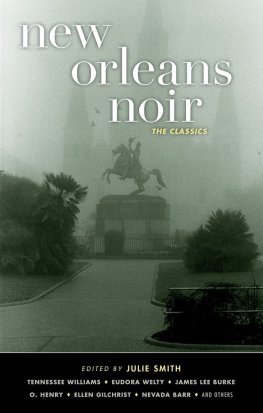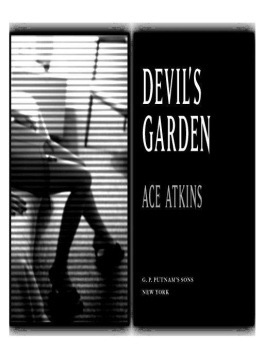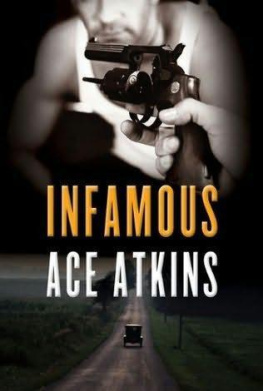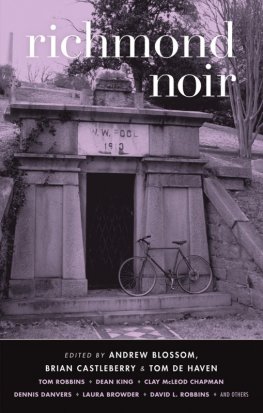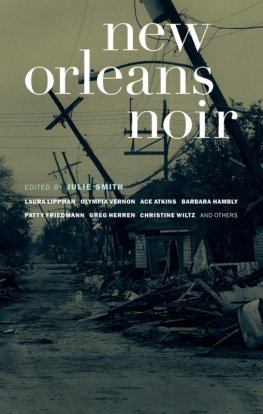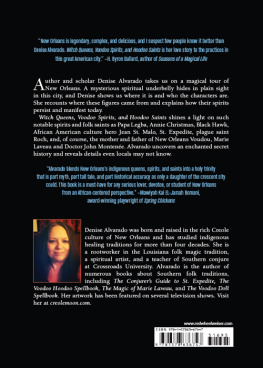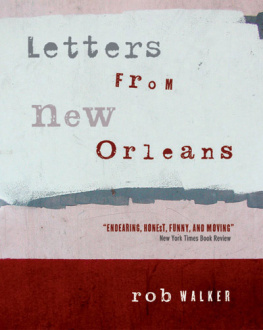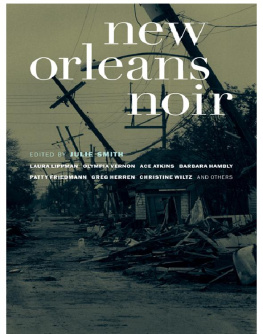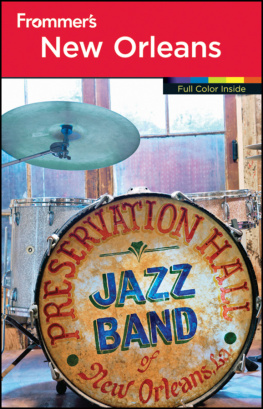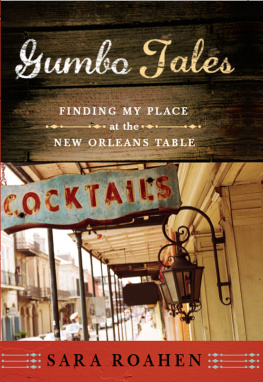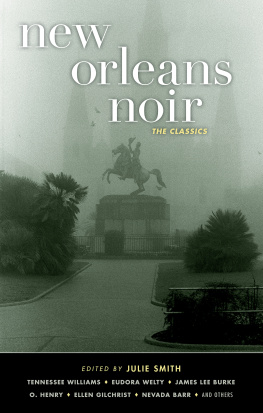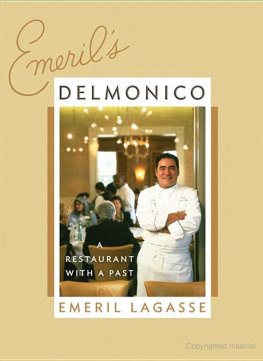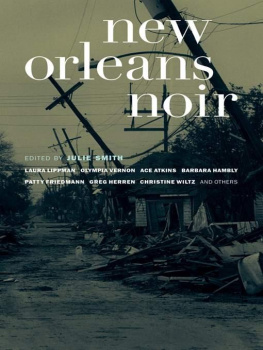Ace Atkins - New Orleans Noir: The Classics
Here you can read online Ace Atkins - New Orleans Noir: The Classics full text of the book (entire story) in english for free. Download pdf and epub, get meaning, cover and reviews about this ebook. City: New York, year: 2016, publisher: Akashic Books, genre: Detective and thriller. Description of the work, (preface) as well as reviews are available. Best literature library LitArk.com created for fans of good reading and offers a wide selection of genres:
Romance novel
Science fiction
Adventure
Detective
Science
History
Home and family
Prose
Art
Politics
Computer
Non-fiction
Religion
Business
Children
Humor
Choose a favorite category and find really read worthwhile books. Enjoy immersion in the world of imagination, feel the emotions of the characters or learn something new for yourself, make an fascinating discovery.
- Book:New Orleans Noir: The Classics
- Author:
- Publisher:Akashic Books
- Genre:
- Year:2016
- City:New York
- ISBN:978-1-61775-384-8
- Rating:3 / 5
- Favourites:Add to favourites
- Your mark:
- 60
- 1
- 2
- 3
- 4
- 5
New Orleans Noir: The Classics: summary, description and annotation
We offer to read an annotation, description, summary or preface (depends on what the author of the book "New Orleans Noir: The Classics" wrote himself). If you haven't found the necessary information about the book — write in the comments, we will try to find it.
New Orleans Noir: The Classics — read online for free the complete book (whole text) full work
Below is the text of the book, divided by pages. System saving the place of the last page read, allows you to conveniently read the book "New Orleans Noir: The Classics" online for free, without having to search again every time where you left off. Put a bookmark, and you can go to the page where you finished reading at any time.
Font size:
Interval:
Bookmark:
New Orleans Noir: The Classics

Introduction
The Many Ways It Can All Go Away
Just after Hurricane Katrina, when New Orleans was at its most noir moment (and so were we all), I was invited by Akashic Books to put together a volume of original stories for the first New Orleans Noir. It perfectly suited all our moods down here, which might account for the extremely high quality of the stories the authors produced. The collection has remained so popular that, almost ten years later, were coming back for The Classics, reprinted stories by some of the finest writers who ever walked the rough-and-tumble streets of the City that Care Forgot a pretty funny sobriquet when you consider what they wrote.
Listen to a character herein: He had it made. Then it all went away... it always goes away. If you know anything, you know that. So wrote John William Corrington in Pleadings, one of the stories collected herein. Its one of my favorite quotes about the noir tradition. Maybe it doesnt apply to everyone in a noir tale, or even always to the protagonist, but you can bet it perfectly describes someones fate.
With one exception, each of these stories reflects that scenario in some way or other in every case theres a terrible loss, sometimes an unbearable loss. Much like in our lives. Most of us, I hope, will deal with our losses in less murderous, self-destructive, and downright horrific ways, but stories like this, even as they make us wince, let us identify with others whove been there.
Sometimes you can practically feel the authors own losses, his or her own desires for revenge or oblivion. And what a magnificent array of authors to choose from! It was a thrill to stroll through two centuries of stories written in a city as rich as delta dirt in literary tradition.
A glittering constellation of writers has passed through New Orleans including Mark Twain, Sherwood Anderson, O. Henry, and even Walt Whitman, to name some of the not-so-usual suspects. Then there are the ones whose sojourns here are better known, the ones on whom we pride ourselves, such as Tennessee Williams, William Faulkner, Eudora Welty, Ellen Gilchrist, and James Lee Burke.
It was an anthologists feast just about everybody who came to New Orleans wrote about it. But there were surprises as well.
Heres what became apparent almost immediately: our well-known fascination with death and funerals and cemeteries and the dark side in general, coupled with our unfortunate notoriety for being Murder Central, hasnt produced a lot of crime stories. So in many cases Ive had to content myself with the dark and brooding. You dont mind, do you? Its very dark and brooding.
But considering the detective story as we know it now wasnt even invented till 1841, nineteenth-century writers in New Orleans probably transferred more than their share of dark thoughts to paper. I noticed right away that many of our early authors were concerned with race and injustice. Thats no surprise, since race is always on our minds here and most of our neighborhoods are either mixed or cheek-by-jowl. Creole, that early word for mixed Spanish or French heritage, now means almost exclusively African American and white.
Many of our nineteenth-century writers were concerned specifically with injustice against people of color, yet most of them, at first glance, were white. My guess is this doesnt mean black people werent writing, just that they didnt find easy avenues to publication. One who did was Armand Lanusse, a well-off and well-educated free man of color who published the first collection of poetry by African Americans in the United States. He was a member of a literary group of men of similar background called Les Cenelles, which was also the name of the collection.
The story of his Ive included is about plaage, possibly nineteenth-century Louisianas most fascinating social custom. It was a contract much like marriage, but always between a white man and a Creole woman. Heres how it was different from conventional marriage: the man was usually also married to someone else! (Invariably someone white.) Though it no doubt had advantages for some women the men were often required to buy them houses and educate their children Lanusse took a dim view. You could even say a noir view.
Grace King, far from being an advocate for African Americans, started writing to rebut the work of George Washington Cable, whose sympathy toward black people she considered objectionable. Given that, its hard to know how to interpret The Little Convent Girl. But Id forgotten her opinions when I read the story, which moved me in a way that may have been different from the way King intended. Rather than try to deconstruct it, Im going to take the view that theres more than one truth in a strong tale.
Kate Chopin was a writer famed for her early feminist novel The Awakening, from which the first section of this anthology takes its name. In The Story of an Hour she writes again about the female role of the time. This one, like many of Chopins stories, is set on a plantation, and several nineteenth-century New Orleans neighborhoods were made up of plantations. A distinguished literature professor I consulted informs me that the setting for this one couldnt be New Orleans, but Im going off the reservation here I think it could be. This plantation sounds exactly like the setting of another Chopin story called Bayou St. John. Therefore, I deduce and decree (for purposes of this anthology) that Bayou St. John is the neighborhood where this tale takes place.
William Sidney Porter (a.k.a. O. Henry) fled to New Orleans in 1896 to avoid trial for embezzlement and ended up setting five stories here. Although his writing career was well along at the time, Whistling Dicks Christmas Stocking, written in prison, was the first story he published under his famous pseudonym. This is the one story in the collection that has a happy ending, but Porters fascination with crime, hoboes, and the down-and-out surely qualifies it as semi-noir, at least!
The middle twentieth century produced more iconic writers with, luckily for the reader, some very creepy perspectives. Desire and the Black Masseur, by Tennessee Williams, and Eudora Weltys The Purple Hat may not be so much noir as gothic, but they both evoke that wonderfully unsettling feeling you get from a good story that freaks you out partly because you know the writer had something in mind that you dont quite understand, and that youll never understand. So your half-delicious nightmares can just go on and on as you think of endless possible interpretations. Both stories are about sex and violence, said the critics, and that seems obvious enough. The critics said quite a bit more, but I think noir readers may just prefer to know theyll give you a good case of the shivers.
In Shirley Ann Graus Miss Yellow Eyes, all roads lead to despair, wrote one critic. Theres no crime in it, but if noir is about a life or a predicament in which everythings gone to hell and theres no way out, Miss Yellow Eyes is the genuine article. Ritual Murder, a short play about so-called senseless murder by Tom Dent, an African American poet revered in these parts, is as true today as it was when it was written thirty-eight years ago. (It really ought to be taught in schools.)
With John William Corringtons lawyer story, Pleadings, we start to get more into the contemporary noir mode. Though originally published in a literary magazine, this is possibly the most bruising yarn in the collection, brutally hyperrealistic, so full of human pain and suffering itll make you want to pull the covers over your head.
I organized the anthology chronologically because I thought it was fascinating to see how ways of talking about violence, brutality, despair, and injustice have evolved over nearly two centuries. It has always been curious to me that New Orleans, with all its mystery and crime, has produced so few detective series. John Dickson Carr once set a trilogy here. But other than that, if there were any at all before Chris Wiltz introduced her Neal Rafferty series in 1981, I can find no record of it. Wiltz was first, but then came a small deluge, including John and Joyce Corrington, ONeil De Noux, Ace Atkins, James Colbert, Barbara Colley, J.M. Redmann, Barbara Hambly, James Sallis, Tony Fennelly, Greg Herren, Robert Skinner, D.J. Donaldson, David Fulmer, Dick Lochte, Tony Dunbar, me, and, a few years later, Bill Loehfelm. There was also, of course, James Lee Burke, but he is
Font size:
Interval:
Bookmark:
Similar books «New Orleans Noir: The Classics»
Look at similar books to New Orleans Noir: The Classics. We have selected literature similar in name and meaning in the hope of providing readers with more options to find new, interesting, not yet read works.
Discussion, reviews of the book New Orleans Noir: The Classics and just readers' own opinions. Leave your comments, write what you think about the work, its meaning or the main characters. Specify what exactly you liked and what you didn't like, and why you think so.

